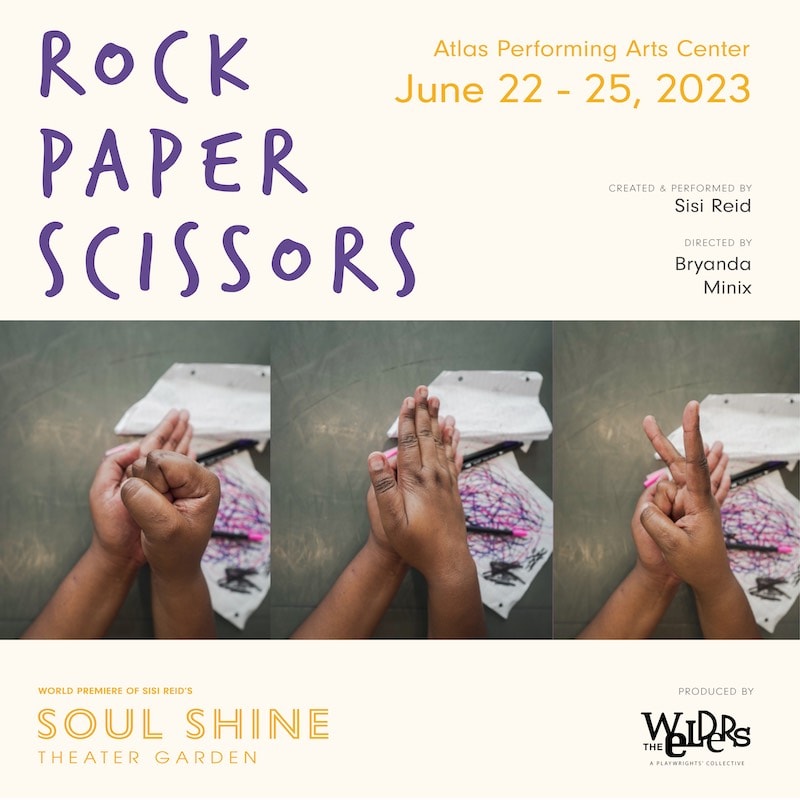Sisi Reid is a member of the third Welders Playwrights’ Collective cohort. The 3.0 cohort was made exclusively of theater workers from a variety of places on the African diaspora spectrum. This diverse group of artists took the reins of the organization just as the shutdown for the COVID pandemic began. Both of those facts presented challenges and opportunities that made this cohort different from the ones that preceded it. Reid’s play Rock Paper Scissors — which runs June 22 to 25 at Atlas — comes just as the tenure of Welders 3.0 is approaching its conclusion. I met with her to talk about her play and her theater journey.
Gregory Ford: When did you become involved in making theater?
Sisi Reid: My first entryway was sophomore year of high school, taking musical theater. I’m a musical theater kid and that sometimes shows up.
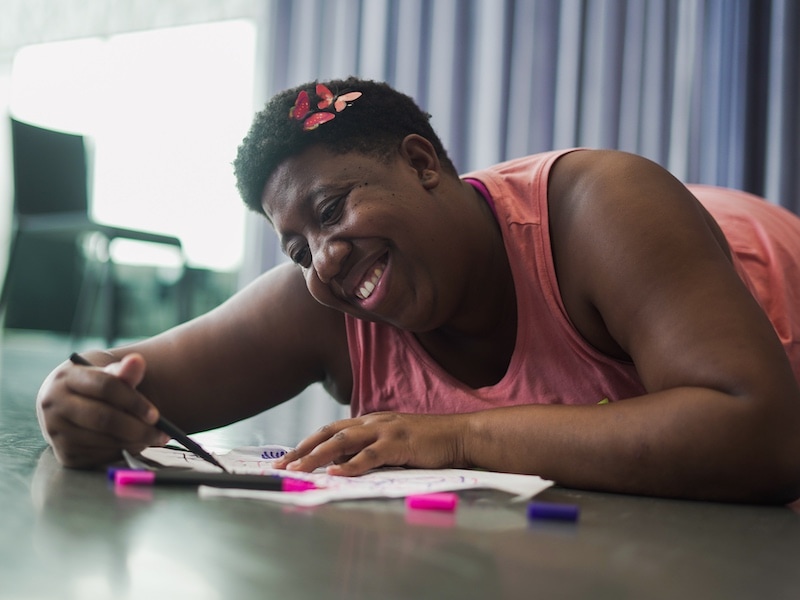
I was in the first musical theater class at Albert Einstein High School in Kensington, Maryland. And then I did the International Baccalaureate diploma program and did two years of IB theater. I was studying not just acting but also set and lights and story and Greek theater and theater from Japan and puppetry and all these different types of theater, which was probably the foundation for me as a holistic creator of theater. I also performed in two musicals in high school and a one-act. College is what opened me up to the possibility that this could be a career. Doing theater with the late, fierce Dr. Walter Dallas and his mentee, Caroline Clay, was fundamental in my coming to understand that this work is about breath and story and legacy and Black culture. That’s when I was like, “I want to keep doing this.” And I never looked back.
I would love to speak more about Caroline Clay. She is so attuned to the embodiment of acting and showing up in truth and in breath. She demanded of me to show up, and she really poured into me not just as a student and a young actor, but personally. She understood what was there in rough form and encouraged me to bring it out through rigor and through love. So she’s fundamental to how I show up and how I teach. I teach in a similar energy of passion, excitement, and high stakes.
And so, I definitely want to uplift her and her mentor Walter Dallas, who passed in 2020. There’s a legacy that I’m a part of. I refer to her as friend, mentor, and my theater mama, which is a big deal. ‘Cause I’m like, I love my actual mommy and Caroline is the only other woman on this planet that I’m like, “Yeah, I will, I give you the respect of a mother title.”
What have been some of your most important moving, transforming theater experiences so far?
I’m glad you’re interviewing me. ‘Cause I think maybe I wouldn’t have thought of this if someone else was. But I have to mention Playback Theater, and I have to mention the applied theater spaces, which I think sometimes still live siloed in my brain, even though they’re all intertwined. But doing theater in prison, doing playback, and getting the privilege to act, embody, or lead people who don’t do theater as a profession, through stories that come from them: that sacred exchange, those sacred spaces have definitely deepened my love of this craft and have shown me how powerful this craft is outside of a “theater” building. Those experiences are definitely a huge part of my becoming better as an actor. It has helped me understand when I do step into a character, even if it is a make-believe world, how important it is to ground in something true and real that can connect to people’s hearts and souls.
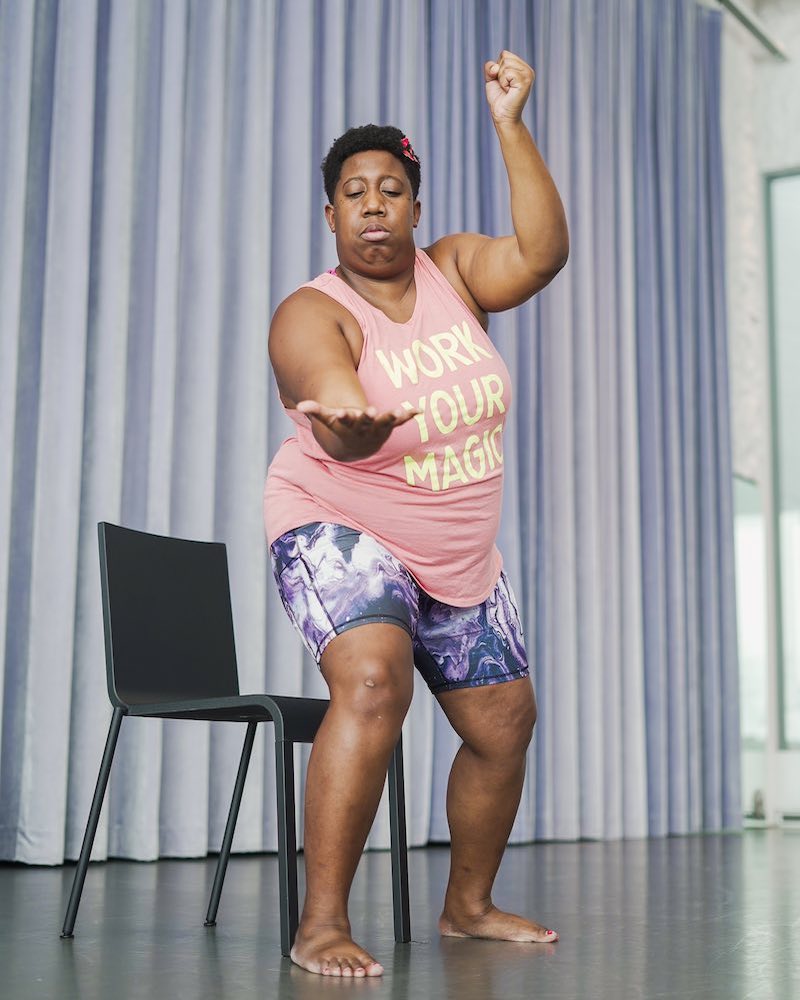
Where did you grow up?
I was born in Norfolk, Virginia, which is where my dad’s side of the family is from. I lived there till I was six and then was raised primarily in Wheaton, Maryland. I would go back and forth to Norfolk to visit my dad and that side of the family. Wheaton is the primary place I call home. It’s a suburb right outside of DC that is very, very multicultural: very mixed languages and ethnicities, which has definitely shaped me.
Just alone on the street where I grew up there was a Vietnamese restaurant, a Brazilian dessert place. Being a Black girl, a Black child raised around different languages, multiculturalism became a lens that is on my art. I’m actually sometimes more comfortable where I can hear other languages in addition to English. It’s funny that the history of this play is rooted in being developed in Brazil first before it was even in the United States. I feel like that’s divine order for me in my life because I am very international when it comes to my Blackness and the way I want to connect with people.
And then there’s Norfolk. My grandfather and family were heavily involved in the Civil Rights Movement and working with Dr. King. Social justice and community are woven into the fabric of me coming from my people from Norfolk. That has also had great impact on how I want to create art for community building and activism, specifically as an activist.
My grandfather, Dr. Milton Reid, worked with Dr. King and was editor of one of the major newspapers in the Norfolk area. He was tall physically and had a big presence. He was my grandfather, but then he also acted. As a child, I saw him preach. I saw him in his element.
My dad was a parole officer, but he used his role to really mentor and connect young Black boys and men to jobs and careers. So throughout the times I would visit my dad, it’s like I didn’t know everything he did at his job, but these random men would come up and be like, “Thank you, Mr. Reid. Thank you.” Every time going to Norfolk, it’s like I learn a little bit more of the impact of the different people in my family and how known the Reid family is in Norfolk. Which is why I don’t want to ever change my last name. I’m Dr. Bill Reid’s granddaughter. That carries weight. We’re gonna keep that.
Does any of that come out in your work?
I love this question. This is the first time I’ve been asked this. I feel like it comes out in my personality for sure. My grandfather was a gifted orator. My dad also had that. I feel like I inherited that quality combined with my mother’s artistry in the way that she takes up space, creatively and spiritually. I feel like it’s the way that I definitely take up space. It’s the way I speak. It’s the loudness of my voice. It’s the attitude of “I got stuff to say. I have deep thoughts.” I was encouraged and taught as a child how to critically think and to keep asking questions.
So I feel like that’s the value system that I get from both sides of my family. Particularly growing up with two generations of men who are like, “This is how we see the world. This is what needs to happen. These are the problems. This is how we solve them.” And my mom also does that as an educator. I go to that same place in the way that I speak, the bigness of my presence, in the way that I see theater and the way I see community and liberation and the way I see white supremacy and the things I need to change in theater culture. So I think it shows up in my art, in the way that I take up space.
My mother is the educator. She teaches English as a second language. She works with a lot of white suburban women speaking about equity, speaking about how to change the curriculum to address what the children need. She understands we all have our own journeys. She allows the space for artistry and spiritual practice to be seen and to be evident. It’s not these siloed things. I feel like being an integrated spiritual person, I definitely learned from her (and from both of my parents). And that definitely speaks to Rock Paper Scissors. Because I’m like, how do I combine all these three things? How do I become whole again? is a question that I asked in the play.
My mom would always say Blackness is not a monolith. I had to go through my own journey with my queerness and my sexuality and my gender to learn that I’m not a monolith. I can be many, many aspects of myself within my Blackness and my womanness. That’s coming back to those family values.
Tell us about Rock Paper Scissors.
Rock Paper Scissors is a world premiere dance-theater solo play being presented by my theater company, Soul Shine Theater Garden; produced by The Welders, a DC theater organization and playwright’s collective; and performed at the Atlas Performing Arts Center in Washington, DC. My fellow Welders producers are Cat Frost, Teshonne Nicole Powell, and Jared Shamberger. Its first iteration was as a 10-minute play that was performed at my alma mater, the University of Maryland, College Park for The Clarice Smith Performing Arts Center’s 2016 NextNOW Fest Alumni Commissioning Project. I was not in that version. Brazil was my first time turning my 10-minute play into a solo play and performing it.
My relationship to the idea is as a child, playing. What was yours?
It’s a game I played as a child. Still will play sometimes. I wrote the play because at the time I was newly coming into myself as bisexual and as queer. And I felt like being all three (a woman, Black, queer/bisexual) would be too complicated, too much. It would prevent me from receiving the love and the care that I wanted and desired and fantasized about. So I was in a very painful place in my journey, and I wanted to explore that in art.
And so I just thought about it: what game has three elements? I was like, well, rock paper scissors. So it’s a very simple kind of origin. And then I just started to ask myself questions. Which element would I assign to which identity? And, why? And then, what are the qualities of rock? What are the qualities of paper? What are the qualities of scissors? What do scissors do? What do rocks do? Where do we find rocks? So I just started to be very explorative about the elements of the game itself. And as I started asking myself the questions, I started to pair up each element of the game with an identity of mine.
Then I started thinking about the functions of the game. One always loses to one. One always wins to one. I was like, Oh, that’s kind of how I feel when I show up in spaces sometimes. Sometimes my Blackness is the first thing that’s seen or hyper-seen. Sometimes the queerness has to be invisible. And so I was playing around with this, winning and losing as well as visible and not visible. As a Black, queer, bisexual woman, when do I feel seen? When do I feel like it’s hyper-focused on? From there, I wrote it as a 10-minute play.
And then a couple years later, around 2017/2018, I thought it’d be more interesting if it was just my body on stage. I was like, What would it look like for me to play rock paper scissors and have to compete within myself? I was intrigued and challenged. So I said, “Let me try that.” And I didn’t start building the piece until I got an opportunity to go to Brazil and present a work in progress.
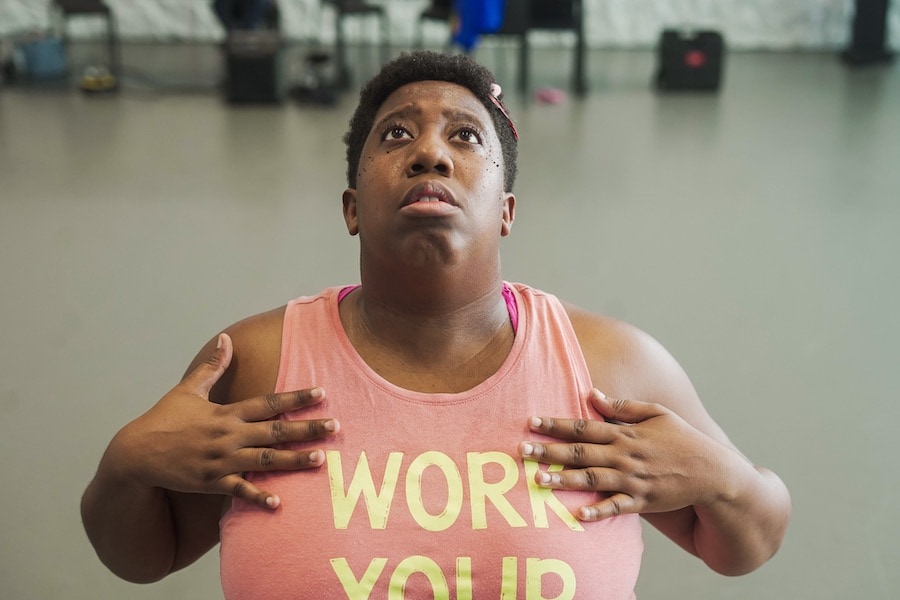
How did Brazil come about?
Sometimes I gloss over that, but it’s pretty amazing. I was living in Michigan for about a year, and I was volunteering with the Prison Creative Arts Project. I wasn’t a student, I was an employee of the university, but the professor who was running the Prison Creative Arts program, Ashley Lucas, who was teaching classes about theater and incarceration, invited me to come in and take the class when I was able to after work. And so now, I’m part of this community of the Prison Creative Arts program. And they’re getting ready for this big exchange trip. These Brazilian artists are gonna come to Michigan, and then the Michiganders are gonna go to Brazil in the summer.
When the artists and professors and students from Brazil came to Michigan, I was changed. We’re exchanging games. We’re like working through cultural barriers and language barriers. And I’m falling in love with these people. They’re falling in love with me. They’re like, “Come to Brazil.” And I’m like, “But I’m not a student. What, what do you mean?” And so Ashley said, “You can come if you raise the money.” I was like, “I can’t.” So I didn’t even think of it as a possibility. So once she said, if you fund the trip, you can come. I got money from family. She also helped me figure out how to book my tickets quickly.
And so, it was a community effort and I was able to go. But another piece of me trying to get there was, there was a grant, an emergency grant: if you have a performance, they’ll give you emergency funds. And so I was like, I’m working on this solo play. Hadn’t touched it yet, but I told these Brazilian professors, I got a solo play I’m working on. They were like, “Okay, we’ll apply for this grant. Bring it. We’ll find a classroom for you to perform. We’ll find a space.” Then, I didn’t get the grant, but they still were like, “We still have you on the schedule. You can perform twice here in this building. And we got you in Rio. We got you.” And I was like, “But I don’t have a play.” The play wasn’t made. It wasn’t made at all. It was all in my head. I think I had some notes. And so I was like, OK, I guess this is my chance. This is the universe saying, OK, do it anyway. And so I got the funds to be able to go to Brazil, and then I started to just put it in my body. And I just started with the elements. I just did a few rehearsals and then created a sequence of a show that was about 15 minutes long.
So I knew it wasn’t the whole thing, but I created a beginning, middle, and end, like I know how to do as an artist. And the space was there for me. So I did it twice. We were at a university in Florianópolis. So I did it twice there. And then I did it once in Rio at the University of Rio de Janeiro. And we did feedback. I got to see the impact of my art at a very early stage because people who knew some English or whose English wasn’t their primary language were like, I understand it. Oh, I’m going through this too. I’m coming out to my parents. Oh, I get what you’re talking about…how hard it is to be queer and all at the intersection.
People in a whole other country who didn’t know me were understanding my art. And I got to see how powerful my mind and my artistry are. And that’s when I was like, OK, there’s no looking back. And now I gotta do this thing. And when I came back from Michigan and Brazil and was settling back into DC, the Welders was aligning as an opportunity. And I was like, Well, I have a show and it’s my solo show, and I guess that will be my Welders show. And here we are three to four years later. So really, I feel like the opportunities aligned for me for the show to be brought back out into the world. Recognizing the opportunity and recognizing when it’s time to go is what led me here.
Did it feel like divine order?
Yes. Yes. Absolutely. Absolutely. It’s interesting retelling the story of that emergency grant. ‘Cause I remember when I didn’t get it, I really thought, “Oh, they’re not gonna want me there.” But they were like, “No, we have space for you.” So I was like, I can’t deny space in Brazil to work on a show, as part of a creative process. I was like, Why would I deny that? So I was like, OK, I guess I have to step up to the challenge.
I went to see for colored girls… on Broadway last year. And Camille Brown spoke about directing her first Broadway show and being scared and then transforming that fear. I was scared to go to Brazil. And I think the thing about saying yes if you’re afraid is, just lean in. And I think that’s the advice that I would give myself going forward as well as other artists.
What do you hope brings people in to see this show?
Ooh, I love that question. I hope (and I want to shout out to my graphic designer, Lex Colton) that from the beautiful graphic design and the marketing, people are curious. The main marketing image is just my hands. And it was like: “You know this game. But what’s this game have to do with the play that’s in the theater?” I want a curiosity that brings you in. Even if you know nothing about the show. Even if you don’t know me, buy that ticket. Follow your curiosity. But I also want it to be super clear throughout this iteration and when I tour the U.S. and the world, which is the goal, the hope, the dream is that you see and understand that this is Black, queer storytelling.
It’s a nod to Black queer cultures and dance and music. It’s not gonna be just one form of a play where you just go sit and there’s a fourth wall. There’s also that desire of like, “Come play with me, Come heal.” You know, hopefully, you walk away asking some questions about your identities. Hopefully, people reconnect to some joy in their life. Joy and some play. And to have you think about some of that play that you maybe missed or want more of in your life.
Welders 3.0 is coming to the end of its tenure. What do you want to say about your time with The Welders?
I came into The Welders with the intention of wanting to learn grant writing. I got an opportunity over the past three to four years to work with Kat Frost on grant writing and now I’m leaving The Welders with an abundance of skill in writing organizational grants and researching grants and also writing project grants and building systems and processes. Now I’m an artist who can obtain the money, who believes that my art is worth funding. The practice with a cohort of people with a board over the three to four years has got me to a place professionally that I’m like, “I’ve done it and now I can keep doing it, in my own way, pace, and rhythm.”
It has been deeply, deeply challenging personally and professionally to start as a group of six, to have a pandemic occur. For me personally, to experience the physical loss of my dad, and to continue producing theater has been just — difficult doesn’t even begin to describe it. It’s been deeply exhaustive. And so, I’m excited to rest more. Now that I’ve experienced this organization, I’ve created my own practices and processes that are rooted in my core values of joy, rest, liberation practice. So I’ve created Soul Shine Theater Garden, which is a philosophy of being and also a way of making theater and producing theater that is rooted in those values that I hold.
This experience from The Welders, in all of its forms of ease and of difficulty, has shown me how necessary it is to root oneself in joy and play and rest always. Before my experience with The Welders, those things were like more optional to me. The way in which I need connection to people when I work with people was like, “Oh, that’s a secondary consideration.” Now I’m very clear as a human being how my need for emotional connection, for spaces to share stories, to check in emotionally, to be able to be human with people, is the [way of] “being” that needs to be centered.
Producing theater in the pandemic has shown me that we gotta be human about this from the beginning, from the middle, from the end. And there’s no other way to do it but that. Unfortunately, I see rampant in the theater community and other industries that that is still not the case. That there is the expectation of us being machines. Which is why I’m creating Soul Shine Theater Garden. We have to remind ourselves that we are the trees and the plants. We need sun, we need water, we need rest, we need stretching, we need dance, we need release, we need all of those things.
With Rock Paper Scissors, I’ve gathered a team of people who are aligned with my values and who helped me slow down, even though I’m still like in producer mode. I have a brilliant director who slows me down and has me share my feelings and create space for me to cry. We feel, we make space, we check in before we even touch the work because we gotta make sure “you’re okay, I’m okay.”
This Welders experience — on a divine level, coming back to that — is and was for me the opportunity to show up in my divinity and my medicine that I have to offer to the world, which is what Soul Shine Theater Garden is. That’s my medicine to the world to help elevate our consciousness to joy, to healing, to collective liberation. And I know that The Welders is fundamental in that experience.
Rock Paper Scissors plays Thursday to Saturday, June 22, 23, and 24, 2023, at 8 pm and Sunday, June 25 at 3 pm presented by The Welders Playwrights’ Collective and Soul Shine Theater Garden performing at the Atlas Performing Arts Center Lab II, 1333 H Street NE, Washington, DC. Tickets ($25, general admission; $15, students and youth) are available online.
Rock Paper Scissors
Created and Performed by Sisi Reid
Directed by Bryanda Minix
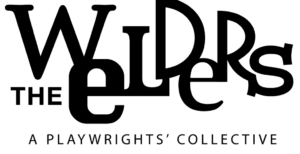
The Welders is a DC-based playwrights’ collective that provides an evolving, alternative platform for play development and production. Through our platform, we inspire and encourage each cohort of producing playwrights to:
- Take risks and make bold leaps in exploring the craft of playwriting
- Produce one performance of work created by each member playwright over the course of three years
- Create significant, meaningful, direct engagement between artists and members of the community
- Support future generations of DC-area playwrights, by passing on the organization and its resources to a new cohort of playwrights at the end of their tenure
Founded in 2013, by Bob Bartlett, Renee Calarco, Allyson Currin, Caleen Sinette Jennings, Jojo Ruff, and Gwydion Suilebhan, the 3rd “generation” of Welders playwrights began its tenure in 2020 and will transition leadership in 2024. Learn more about The Welders at thewelders.org.


